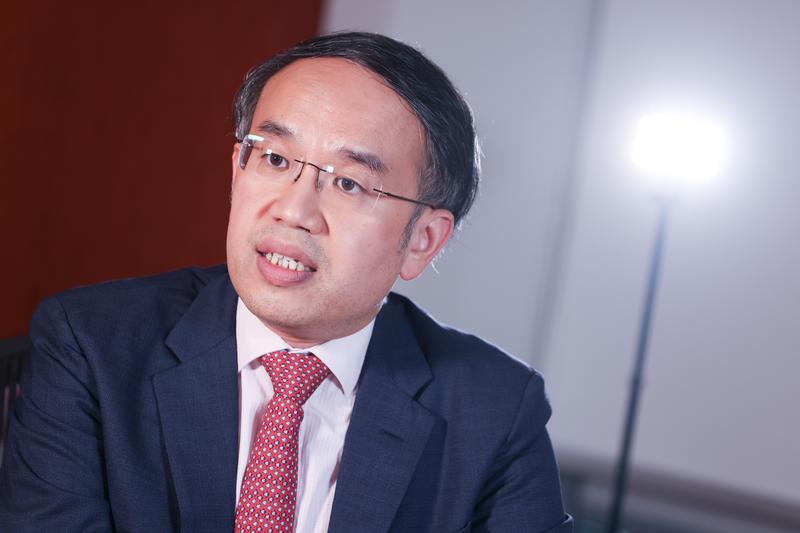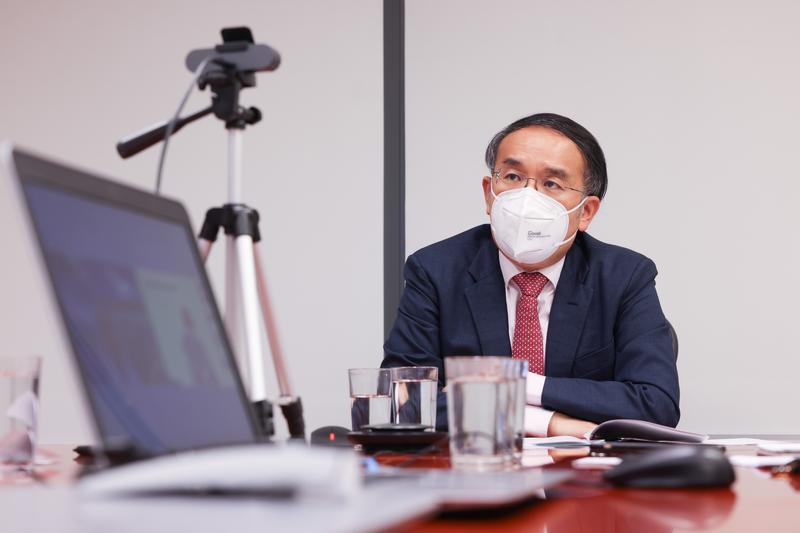 Secretary for Financial Services and the Treasury Christopher Hui Ching-yu gives an interview with China Daily on Aug 30, 2022. (CALVIN NG/CHINA DAILY)
Secretary for Financial Services and the Treasury Christopher Hui Ching-yu gives an interview with China Daily on Aug 30, 2022. (CALVIN NG/CHINA DAILY)
Hong Kong will pursue the strategy of diversifying products, setting standards, wooing professionals, and bolstering connectivity with the mainland and global financial markets to develop the city into a full-fledged international finance center.
Secretary for Financial Services and the Treasury Christopher Hui Ching-yu made the remarks in an interview with China Daily.
The focus of the special administrative region government’s attention are green financing, the family-office and private-equity sector of the wealth management business, captive insurance, and initial public offerings.
Once (having a regional carbon market) is being done, we will be able to leverage our strengths in the financial services sector and broaden it to incorporate into the carbon market such that people can use the instruments and tools being available to them to mitigate the climate risk.
Christopher Hui Ching-yu, Secretary for Financial Services and the Treasury
Regarding green financing, Hui said that the HKSAR government is targeting not only green-bond issuance, but also looking at developing a regional carbon market in such a way that carbon credits can be traded in Hong Kong.
“Once (having a regional carbon market) is being done, we will be able to leverage our strengths in the financial services sector and broaden it to incorporate into the carbon market such that people can use the instruments and tools being available to them to mitigate the climate risk,” Hui said.
ALSO READ: Officials: HK financial system to remain stable despite US rate hikes
In 2021, a total US$31.3 billion of green and sustainable bonds was issued in Hong Kong, representing one-third of the Asian market, according to government statistics.
The Hong Kong SAR has issued close to US$10 billion in green bonds, mainly targeting global institutional investors, according to the government’s “Green Bond Report 2022”. Issuances included a 30-year US-dollar-denominated green bond and a 20-year euro-denominated green bond, both of which were the first of their kinds issued by an Asian government.
Besides green investment product instrument, the government is also considering how to cement the city as a ESG (environmental, social and governance) hub by improving the standard of the green financing market in Hong Kong.
 Pedestrians cross a street in Hong Kong on Oct 31, 2021. (BERTHA WANG / AFP)
Pedestrians cross a street in Hong Kong on Oct 31, 2021. (BERTHA WANG / AFP)
“I will say this is not just about bonds issued by the public sector or private sector, but more about standards because, in terms of the global trend, people are concerned about ‘greenwashing’. And that why the need for standards and also standardized disclosure is ever more important,” Hui said.
ALSO READ: 'One country, two systems' 'crucial' to HK's financial sector
Besides green investment product instrument, the government is also considering how to cement the city as a ESG (environmental, social and governance) hub by improving the standard of the green financing market in Hong Kong
The financial services minister said the city’s regulators and the Hong Kong Stock Exchange are now “working out in terms of the readiness to comply with the standards set out by the International Sustainability Standards Board”. The ISSB is a standard-setting body relating sustainability-related financial reporting standards to meet investors' needs for sustainability reporting.
The government will provide support to groom more homegrown professionals who are proficient in ESG and its standards. It will also set up the category of ESG talent in terms of admitting professionals from abroad.
Promoting family-office and private-equity business is the second objective. By fortifying these two aspects of the wealth management business, the Hong Kong SAR is poised to become a full-fledged international finance center, Hui said.
Diversifying the fund structure is the first strategy. Hong Kong now boasts more than 500 limited partnership funds in the family office business created in less than two years. The government is also encouraging the setup of funds in the form of open-ended fund companies, and the number has quadrupled over the past year.
Promoting family-office and private-equity business is the second objective. By fortifying these two aspects of the wealth management business, the Hong Kong SAR is poised to become a full-fledged international finance center, Hui said
The administration is also fostering the redomiciliation of funds already set up somewhere else to come back to Hong Kong against the backdrop of international onshoring. “Hong Kong already has a regime in place, not just for funds set up in Hong Kong, but for funds set up somewhere else to come back and be redomiciled here without the need for them to reconstruct the whole fund structure,” Hui said.
ALSO READ: Rising to challenges, HK remains key global financial hub
Second, the government is leveraging tax incentives to enrich fund structures. It is mulling introducing a tax bill to the Legislative Council to introduce a tax concession for single-family offices, for which the retroactive effective date will be April this year if approved. It also already introduced tax concessions for carried interest for private equity funds and publicly registered funds.
 Photo shows a view by Victoria Harbour in Hong Kong on June 11, 2020. (LI GANG / XINHUA)
Photo shows a view by Victoria Harbour in Hong Kong on June 11, 2020. (LI GANG / XINHUA)
Throughout the past few years, we have strengthened our connectivity with the mainland, including our various Connect programs. We are also trying to broaden our mutual recognition of funds regimes with other jurisdictions.
Christopher Hui Ching-yu, Secretary for Financial Services and the Treasury
Hong Kong also rides on connectivity with the mainland and the rest of the world to propel the growth of the wealth management business by creating more investment channels, Hui said.
“Throughout the past few years, we have strengthened our connectivity with the mainland, including our various Connect programs. We are also trying to broaden our mutual recognition of funds regimes with other jurisdictions.”
Year 2021 witnessed the overall assets under management of Hong Kong’s wealth management industry totaling more than US$4.6 trillion, whereas 65 percent of them were sourced outside Hong Kong, Hui said.
Hong Kong also aspires to be the regional risk management center as it is line with the country’s 14th Five-Year Plan (2021-25) and dual circulation strategy. Global investors are also more eager and more aware of the need to better manage risks.
ALSO READ: 'Embracing motherland, HK financial industry grew rapidly'
Hui said the government has introduced a profit tax concession regime for captive insurance, and also broadened the scope for the category for captive-insurance agents to operate in Hong Kong. “First of all, to bring more players here in such a way that more players in this domain can operate in Hong Kong, and secondly is to enrich the product ecosystem here,” he said
 Secretary for Financial Services and the Treasury Christopher Hui Ching-yu gives an interview with China Daily on Aug 30, 2022. (CALVIN NG/CHINA DAILY)
Secretary for Financial Services and the Treasury Christopher Hui Ching-yu gives an interview with China Daily on Aug 30, 2022. (CALVIN NG/CHINA DAILY)
If you are talking about the convergence of capital from East and West, and also (investment) exposure that mainland investors are trying to seek in the country and in Asia, Hong Kong is the natural place for them. These fundamentals will allow us to further to grow our role as the IPO hub and at the same time to allow us to pursue the reforms highlighted to make us more attractive and also more competitive.
Christopher Hui Ching-yu, Secretary for Financial Services and the Treasury
Hui is confident that global portfolio managers will have demand for insurance-linked securities issued in Hong Kong because from the perspective of risk diversification, the risk of investing these securities are unrelated to economic events.
Last but not least, the financial services chief said that Hong Kong is still an attractive fundraising venue for mainland enterprises as well as Asian companies even though the city’s IPO market has been very quiet in the first half of this year.
“If you are talking about the convergence of capital from East and West, and also (investment) exposure that mainland investors are trying to seek in the country and in Asia, Hong Kong is the natural place for them. These fundamentals will allow us to further to grow our role as the IPO hub and at the same time to allow us to pursue the reforms highlighted to make us more attractive and also more competitive,” Hui said.
The latest number of applications that the Hong Kong Stock Exchange’s IPO teams are processing is more than 170, Hui said.
The financial services chief said the Hong Kong Stock Exchange is planning to introduce a new specialist technology segment to the city’s main board market. The investor protection concern should be addressed and investor education should be provided so that investors can appraise the value of these specialist technology companies which can be without revenue or profits, Hui said.
READ MORE: Hui calls for grabbing new opportunities in ESG, fintech
He also noted that there is a specialist group under the Hong Kong Stock Exchange’s listing committee to explore how to further enhance the role of the Growth Enterprise Market board to support small and medium-sized enterprises.
Hong Kong can enrich the sources of listing companies, Hui said. “We can see the economies like ASEAN or other Asian economies are also growing. There will be a need for them for fundraising to spur business growth so that Hong Kong can position itself not just as the fundraising center for our own companies of the country, but also as a fundraising center for companies in Asia at large.
“I will be going to Southeast Asia soon in order to bring more of these companies here and also to appeal to them in terms of our
advantages, being a fundraising center,” Hui added.


